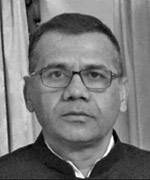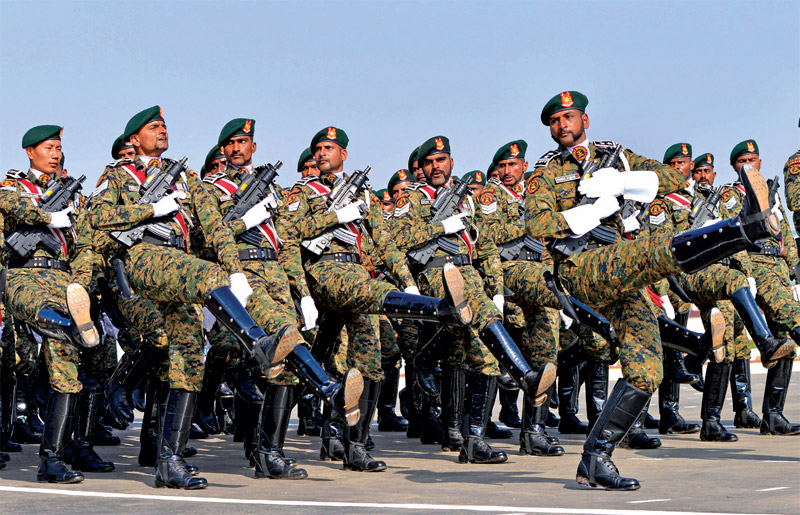Need to raise a special pool of central forces just for internal security duties
 R.C. Sharma
R.C. Sharma
Internal security means security within the territorial borders of a sovereign state and compliance to various national and state laws enacted for the maintenance of law and order within the boundaries of a sovereign state. This clearly means that internal security encompasses law and order. That is the reason that the framers of the Constitution bestowed the responsibility for maintenance of law and order to state governments.
As per the seventh schedule of the Article 246 List-I, that is the Union list, the defence of India, deployment of any armed forces of the union falls under the domain of the Union government. Public order and the police fall under List-II, that is the state list, and is the exclusive domain of state governments. Internal security is within the state domain only until the state police exclusively maintain public order. A state requisitioning central armed police forces to tackle a situation is an indication that the police lack the capability to handle the situation.
It could also be taken as acceptance of the collapse of public order leading to an internal security situation with wider national security ramifications. That is the reason the ministry of home affairs (MHA) has its own definitions of internal security wherein every collapse of public order may not be an internal security issue requiring direct involvement of the MHA despite the fact that central armed police forces (CAPFs) have been requisitioned in aid of civil power. As per para 2.1 of the annual MHA report for 2021-2022, internal security issues in the country can broadly be categorised as terrorism in the hinterland of the country, left wing extremism (LWE) in certain areas, insurgency in the north eastern states and cross-border terrorism in Jammu & Kashmir.
If the internal security situation is analysed, large parts of the country face security challenges leading to the deployment of CAPFs, although it is a fact that CAPFs are called every now and then citing police inability to deal with a situation. During elections the CAPFs are placed at the disposal of the election commission. Therefore, the election process can also be categorised as an internal security situation as the state law and order machinery is incapable if conducting elections in a free and fair manner. The CAPFs comprise internal security and border guarding forces such as the BSF, CISF, CRPF, ITBP and the SSB, with a combined strength of more than a million. They are a major resource at the disposal of the union government to deal with internal security problems. Considering the volatile security scenario existing in various parts of country, the CAPFs are called in aid of civil power to ensure peace as the state law and order machinery is unable to deal with the situation. Keeping the volatility of situation in mind, the Rapid Action Force (RAF), a specialised force for handling law and order problems, came into existence in 1992 to provide an instant response during riotous situations in general and communal or sectarian conflicts in particular. These battalions are located in highly sensitive locations across the country to facilitate quick response and to control a potential flare-up. But despite the deployment of the CRPF and the RAF, there is still a need to deploy border-guarding CAPFs to meet the shortfall in the security grid.
The primary role of border guarding CAPFs is to guard the country’s borders against any external threat. It is a fact that no surplus troops and battalions are available which can be spared from their primary role for internal security duties. Yet, battalions and companies are withdrawn resulting in gaps in the borders and affecting internal and external security. The frequent deployment of border guarding CAPFs for internal security duties affect their professional capabilities. It also leads to an increase in the area of responsibility, non-availability of troops for training, leave accumulation and increased hours of duty and stress. Command and control become difficult for field commanders. Continuous deployment also affects the standing of the CAPFs in public esteem, diluting effectiveness.
It is not that the MHA, the administrative controlling authority of the CAPFs, is not aware of the problem of frequent deployment. The government has been advising states to strengthen their own capabilities to deal with law and order issues and to requisition the CAPFs only if there are serious reasons for doing so. But there has not been much improvement on the ground and states continue to ask for the CAPFs frequently. The MHA through their office memorandum on 18 October 2017, reiterated that requests were being received from states for CAPF deployment in a routine manner without proper assessment of the situation. The memorandum said state governments were merely forwarding requests received from district administrations. Requests are received for the deployment of the CAPFs for festivals, Friday prayers and even for elections in colleges and local bodies such as panchayats, councils and corporations.

The fact is the CAPFs cannot substitute state police forces. They should only be called to deal with emergent unforeseen crises. Before requisitioning the CAPFs, the state governments were advised to form local committees under the chair of ADG (Law & Order) with representatives from the SIB and the CAPFs at the level of DIG/ commandant as co-opted members to analyse various factors. Despite these elaborate instructions, the CAPFs are called and deployed very frequently. There is a need to maintain a balance and find ways and means to tackle a security situation without the CAPFs.
What needs to be done? There is a need to have a special pool of CAPFs at the MHA’s disposal which can be deployed on the requisition from the states after assessing the situation. Budgetary reasons and constraints should not be a reason to overrule the need for this special pool as national security and national interest take priority over everything else.
There is also a need to carry out a study of the quantum of border guarding CAPFs deployed for internal security duties, including conduct of parliamentary and state elections for the last five years. The study should be conducted by the MHA and each border guarding CAPF. It will give a fair idea of the CAPFs deployed for such duties each year. The study should also analyse how the primary role of the CAPFs was affected as a result of their deployment for internal security. Based upon a five-year assessment of the data, a plan should be devised to raise additional battalions in each CAPF. The raising of the additional battalions has to be in consonance with the average yearly deployment based upon the five-year data for the whole country. For the purpose of command and control of the special pool of the CAPFs, a separate internal security directorate needs to be formed in each of the border guarding CAPF headquarter. These directorates should be responsible for deployment of CAPF battalions for internal security duties.
The proposal, if accepted, will have many advantages over the traditional system of deployment of border guarding forces. The new system will end the dilution of the primary role, strengthening border security and removing functional instability encountered by battalions due to shortage of manpower for their primary role. The troops face a lot of stress because of frequent movement, denial of timely leave owing to duty commitments, and inadequate rest and relief. According to an Indian Express report on 4 July 2023, a task force in its draft-report submitted to the MHA last month pointed out that discrimination, abuse trauma and bullying were major causes of suicides and fratricides in the CAPFs. Working conditions and personal/ individual issues also led to such incidents.
The new system will have full-fledged battalion deployment for internal security duties, doing away with ad hocism and keeping regimentation intact with better synergy. Battalion deployment will ensure better effectiveness on the ground with better operational results. It is not that these battalions will be permanently deployed for internal security duties. They will complete their tenure and will be rotated.
Hostile neighbours surrounding India sponsor cross border terrorism, posing internal security challenges in the near and distant future. These internal security challenges require an effective external and internal security regime. Thus, there is a need for a strong border security apparatus which does not allow cross border infiltration as well as illegal migration and smuggling of drugs and arms/ ammunition. There is also a need to have a strong internal security structure to meet the challenges of law and order, modern day internal wars in terms of terrorism, insurgency and Left-wing extremism, which requires enhanced vigil and increased boots on the ground. The dedicated internal security directorate with dedicated internal security battalions will prove to be milestone in strengthening internal as well as external security. It will also lead to better man management and resolve many issues such as frequent movement and increased duty hours that affect morale and motivation.

